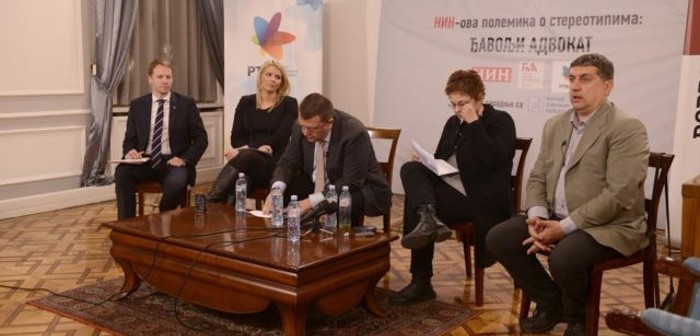Is the Serbian government being controlled by independent institutions? To what extent can one criticize the work of the PM, the President and other state officials without being labeled as a “foreign mercenary”? Why do the bearers of executive power perceive all criticism of their work as an attack on the state? These were some of the questions which were discussed Wednesday night at a debate in Belgrade held in the House of Culture where reporters, NGO activists and political analysts expressed their views.
The debate took place at a time when the dust hadn’t completely settled after the attacks that the Balkan Investigative Reporters Network had been exposed from the executive branch and the ruling party as well as the tabloids.
However, Branko Radun, a political analyst, thinks the opposite, that some media are orchestrating a campaign against the highest reprsentatives of the state.
An example of such a campaign in is “Blic” and it’s front pages and their conduct towards the President. “In my opinion they crossed the line of good taste and constructive criticism and looks more like a campaign aimed at thrashing not rating of the acting president, but the institution of the Serbian president itself as well,” says Radun.
On the other hand, Tamara Skrozza, a reporter for the weekly magazine “Vreme” and a member of the Press committee, points to a different case. She reminds us that the president of Serbia Tomislav Nikolic filed a complaint to the Council because of an article in “Blic” titled “While Serbia Drowns, Nikolic is Making Brandy”, alluding to the activities of the head of state during last year’s floods.
After the Press Council reviewed and rejected Nikolic’s complaint as unfounded, they received a letter from the Cabinet of the President.
It says in the letter: “If the papers were to be free to do anything their backers wish, he, the president, probably wouldn’t be breathing right now.” “I direct your attention to this case because it is very illustrative and shows clear as day how the government reacts when someone tries to criticize it in any way,” says Tamara Skrozza.
Vicicevic states, “Nobody disputes the “Belgrade Waterfront.”
A question was asked during the debate – why haven’t there been any critically oriented reports about the “Belgrade Waterfront” on the public broadcasting network, especially after some public experts voiced their disagreement with the project, saying that the whole enterprise is a failure?
“But what is criticism? Criticism is solid evidence that something isn’t right. Up to now, while I was in office, I honestly haven’t at any point seen someone dispute that. Sure, voices of dissent started showing up a few days ago but up to now since the time that the “Belgrade Waterfront” project has been made public I haven’t heard anyone say ‘No, this isn’t right, this is wrong,’” says Ivana Vucicevic.
Ivana Vucicevic, editor in chief of Belgrade’s Radio-television “Studio B”, replied to this presentation, saying that the government has the right to criticize as well. The debate escalated occasionally into rows, where Vucicevic and Mirko Popovic, an activist, crossed spears.
“Why doesn’t the government have the right to criticize? If any individual who isn’t in the government, weather he is from the opposition or anywhere else, has that right, why shouldn’t the government have a space where it can express critical views?” asked the editor in chief of Studio B, to whom Popovic from the audience replied:
“You can’t have views on whether you like something or not when you are in office. You can go home and tell your family. Imagine if my colleagues from the civil sector had the right to, say, organize a press conference and gather all reporters in the government building, like the PM does, and say what they think. I remind you- he said that people who were conducting an investigation were foreign mercenaries. He hadn’t addressed any of the facts they brought up and instead he labeled those people as a figure in public office.”
The critically inclined media weren’t the only ones under pressure. Ombudsman Sasa Jankovic went through a “trial by fire” in the Serbian Parliament’s security committee, because he filed a report against an officer of the military police who participated in the incident in which the PM’s brother Andrej Vucic was beaten during Belgrade Pride.
“Finally, you have the findings of that committee and in the last one it says that if the ombudsman wishes to open a similar subject in the future he should first inform the parliament’s Security Committee. This really shows a lack of understanding of the role of the ombudsman as an institution who can open discussion on such matters in the media, which is one of the strongest weapons in his arsenal,” says Milan Antonijevic, director of the Lawyers Committee for Human Rights (YUCOM).
Branko Radun, however, points out that Jankovic, in spite of critiques coming his way, hasn’t been removed from office:
“That, in my opinion, is an argument in favor of there being some sort of institutional and independent media structures that the government can influence but of which it can’t change the people at their front.”
With an assessment that the independent bodies in Serbia are doing a good job, considering the circumstances and the pressures they are exposed to, Tamara Skrozza concludes:
“This government, if it wishes to be democratic, has to allow itself to be controlled, regardless of whether it likes that term what it implies and, above all, regardless of it’s dislike of the controllers.”





